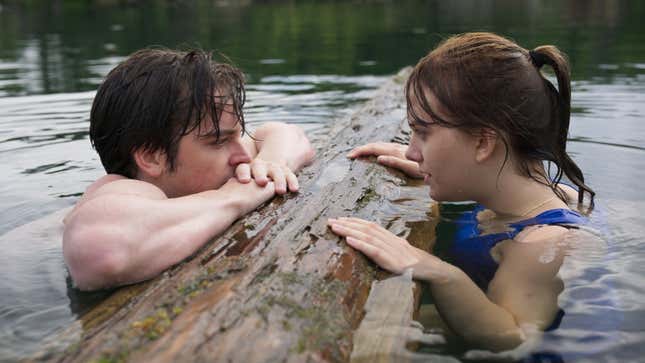
The best and the worst of writer-director Siân Heder’s heartwarming underdog drama CODA are on display in the film’s first 15 minutes. Early on, Heder excessively stacks the deck against her high school heroine, Ruby Rossi (Emilia Jones). The popular girls in Ruby’s class look down on her because she dresses unfashionably and she often smells like fish—a byproduct of waking up before dawn to work on her family’s trawler. In their Gloucester, Massachusetts neighborhood, the Rossis have long been figures of curiosity and pity, in part because Ruby’s parents, Jackie (Marlee Matlin) and Frank (Troy Kotsur), and her brother, Leo (Daniel Durant), are deaf, and in part because they often behave eccentrically in public, unconcerned with what people think about them.
This is a lot for one teenage movie character to bear. And that’s not even taking into account the crush Ruby has on the seemingly unattainable pretty boy Miles (Sing Street’s Ferdia Walsh-Peelo), or the pressure that ensues when her family decides to organize a co-op so they can stop selling their daily catch to a broker that undervalues their work. Then there’s CODA’s biggest plot complication: that Ruby has recently discovered a love of singing and wants to go to college to nurture that talent, leaving her folks without the unpaid interpreter they rely on to keep their business afloat.
In short, CODA is the kind of film that piles crisis upon crisis, making everything much bigger than it needs to be, while also compressing a lifetime of drama into a few months of the characters’ lives. It’s not just that Ruby wants to study music; her choir teacher, Bernardo Villalobos (Eugenio Derbez), thinks she should try out for the Berklee College of Music, even though she just started singing in public in her senior year. It’s not just that her family counts on her to translate for them; they genuinely seem never to have considered that she might want to live her own life someday, or that they ought to have a backup plan for their fishing co-op. The narrative contrivances border on the extreme. Heder—freely adapting the French film La Famille Bélier—makes sure to pop every last kernel of corn, even if it leaves some of the batch overdone.
And yet damned if the movie doesn’t still work. The climactic emotional beats are telegraphed almost from the beginning, but they still hit hard, effectively leaving viewers who can suspend their disbelief feeling uplifted and dewy-eyed. There’s a reason CODA became the first Sundance Film Festival entry to win the Grand Jury Prize, the Audience Award, and the Directing Award (along with a Special Jury Prize for Best Ensemble).
Credit an outstanding cast, the principals of which are deaf themselves, and perform long scenes using only American Sign Language (subtitled in English). While Jackie and Frank’s stubbornness feels forced at times, Matlin and Kotsur do a lot to flesh out those characters, expressing their humor and passion in their signing and in their faces. And Durant has a pivotal part to play as the older brother who resents how much his parents rely on Ruby, rather than trusting him to learn how to interact with the hearing world. Matlin, a Hollywood veteran, remains the only deaf actor to ever win an Academy Award, but she doesn’t upstage her less famous costars.
And save some credit, too, for Heder’s command of the smaller details of Ruby’s situation. CODA’s premise—or premises—may be broadly sketched, but there are subtle shadings throughout. Even as Ruby is having woe heaped upon her in those opening minutes, Heder and Jones are also capturing the complexity of her situation: how she loves her family and enjoys working on the boat, but is also embarrassed and frustrated by how little her dad and brother try to fit in with their fellow fishermen.

Even the preposterousness of Mr. Villalobos thinking he can get an untrained 17-year-old into Berklee is mitigated by some of the more realistic and moving one-on-one interactions between the teacher and Ruby, as he coaxes her into admitting her hangups and freeing her voice. (Derbez too gives a memorable performance, in a film that doesn’t lack for them.) There are some keenly observed moments throughout the film concerning Ruby’s love of music, from the pleasure she takes in blasting her stereo without disturbing anyone in the house to her telling affection for the primitivist garage-pop band The Shaggs.
All of these finer pieces of groundwork lead to CODA’s powerhouse final half-hour, where the the two generations of Rossis finally reckon with their dreams and disagreements. The over-the-top early scenes give way to quieter highlights, like Jackie telling Ruby the story of how she reacted when she found out her baby daughter wasn’t deaf, and Frank trying his best to experience Ruby’s singing by feeling the vibrations on her neck. CODA isn’t in the same league as Running On Empty or Lady Bird, to name two equally wrenching movies about college-bound kids and their prickly parents. But true to its title—which stands for “child of deaf adults”—the film ultimately offers its own original perspective on a coming-of-age story. The movie excels when it avoids by-the-numbers melodrama, instead aiming to show something unique and true.